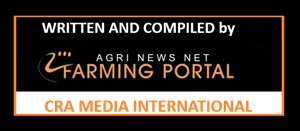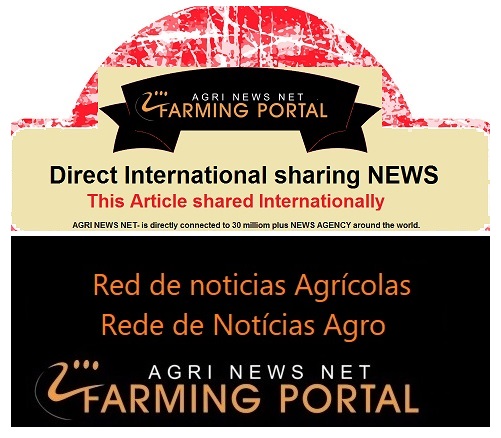World Farming Agriculture Commodity news - Weekly Updated - Exclusive and very popular - Delivering a Media service 365 days of the year
South Africa will proceed with its long-awaited vaccination strategy against Highly Pathogenic Avian Influenza (HPAI), Deputy Director-General Dipepeneneng Serage announced this week at the AVI Africa conference.
Serage, who oversees agricultural production, biosecurity and natural resources, confirmed that the government is ready to begin rolling out vaccines under a new science-led and tightly regulated framework.
“My job is to bring science and legislation together and allow farmers to farm without risking anyone’s health, while positioning South Africa as a net exporter of food,” he told delegates.
The HPAI vaccination strategy is built on four key pillars:
Controlled use of vaccines – Only officially registered vaccines may be used, and farmers must register and comply with strict protocols.
Biosecurity – Improved on-farm biosecurity remains central to disease prevention.
Traceability – All vaccinated flocks must be fully traceable to protect export markets.
Surveillance – Continuous monitoring will ensure rapid response to new outbreaks.
Serage stressed that the approach aims to deliver “maximum benefit of vaccination with the minimum risk” associated with unregulated use.
Three H5 vaccines have already been registered, and an H7 vaccine is in development. One farm is currently under evaluation and could be the first to begin vaccinations under the new framework.
“We have the data, we know which farms we’re starting with — now we have to start,” Serage said.
While the science behind vaccination continues to evolve, he added, the urgency of the HPAI threat requires immediate action.
The announcement marks a major step in bolstering the resilience of South Africa’s poultry sector and maintaining its export potential in the face of ongoing disease risks.

US President Donald Trump said he would issue an order soon to address the effects of his immigration crackdown on the country's farm and hotel industries, which rely heavily on migrant labour, reported Reuters.
"Our farmers are being hurt badly and we're going to have to do something about that... We're going to have an order on that pretty soon, I think," Trump said at a White House event, adding that the order would address the hotels sector, too.
He did not say what changes the order would implement or when it would take effect. Representatives for the White House and Department of Homeland Security had no specific comment about the order, while representatives at the Department of Agriculture could not be immediately reached.
"We will follow the president's direction and continue to work to get the worst of the worst criminal illegal aliens off of America's streets," DHS Assistant Secretary Tricia McLaughlin said.
US farm industry groups have long wanted Trump to spare their sector from mass deportations, which could upend a food supply chain dependent on immigrants.
Nearly half of the nation's approximately 2 million farm workers and many dairy and meatpacking workers lack legal status, according to the departments of Labour and Agriculture.
US Agriculture Secretary Brooke Rollins told CNBC that Trump was reviewing all possible steps but that Congress would have to act.
Zippy Duvall, president of the American Farm Bureau Federation, a leading farm lobby, said on Thursday that farm workers were key to the nation's food supply.
"If these workers are not present in fields and barns, there is a risk of supply-chain disruptions similar to those experienced during the pandemic," Duvall said in a statement.
The COVID-19 pandemic resulted in labour shortages and supply-chain snarls, with meat plants forced to idle and dairy farms to dump milk, and consumers encountering emptier shelves at grocery stores.
In recent days, demonstrations have been taking place in major US cities to protest immigration raids.
Trump is carrying out his campaign promise to deport immigrants in the country illegally. But protesters and some Trump supporters have questioned the targeting of those who are not convicted criminals, including in places of employment such as those that sparked last week's protests in Los Angeles.
On Thursday, Trump acknowledged the impact of the crackdown on sectors such as the hotel industry, which includes his company. The Trump Organization has said Trump's adult sons are running his business.
"Our great Farmers and people in the Hotel and Leisure business have been stating that our very aggressive policy on immigration is taking very good, long time workers away from them, with those jobs being almost impossible to replace," he wrote on his social media platform. "Changes are coming!"
Farmers have a legal option for hiring temporary or seasonal labor with the H-2A visa program, which allows employers to bring in seasonal workers if they can show there are not enough US workers willing, qualified and available to do the job.
Rollins said Trump was "looking at every potential tool in the toolkit" and pointed to the length of the temporary H-2A visas.
"The president understands that we can't feed our nation or the world without that labor force, and he's listening to the farmers on that," she told CNBC.
-
Net Sales for 2025: 15,300 MT, up 71% from the prior week and 21% from the 4-week average.
-
Key Markets: South Korea (6,100 MT), Japan (3,200 MT), Mexico (2,700 MT), Taiwan (2,100 MT), Canada (1,400 MT). Reductions for China (2,000 MT).
-
Exports: 14,500 MT, up 33% from the prior week and 12% from the 4-week average. Primary destinations: South Korea (5,300 MT), Japan (4,200 MT), Mexico (1,300 MT), Taiwan (1,300 MT), Canada (800 MT).
-
Net Sales for 2025: 9,700 MT, down 73% from the prior week and 70% from the 4-week average.
-
Key Markets: Japan (3,600 MT), Canada (1,900 MT), Colombia (1,400 MT), South Korea (900 MT), China (700 MT). Reductions for Mexico (1,200 MT) and Honduras (600 MT).
-
Exports: 33,800 MT, up 40% from the prior week and 25% from the 4-week average. Primary destinations: Mexico (12,800 MT), Japan (5,100 MT), Colombia (4,100 MT), China (3,200 MT), South Korea (2,500 MT).
-
US Egg Prices: Dropped 11% in May to $4.548/dozen, the lowest since December. Down 27% from March peak but nearly double last year’s prices.
-
Demand: Weak due to seasonal summer shift to grilling meats.
-
Supply: Ongoing bird flu outbreaks (e.g., 5.5M birds affected in Arizona since late May) raise concerns, but subdued demand drives lower prices.
-
Mexico: Eased chicken import ban, restricting only Rio Grande do Sul products.
-
Mauritania & Oman: Mauritania banned all Brazilian chicken; Oman banned Rio Grande do Sul products.
-
Context: Brazil’s May poultry exports fell 12.9% ($655M) and 14.4% in volume (363,100 MT) due to HPAI outbreak.
-
Exports: 237M lbs, down 7% from March, 9% from April 2024. China exports collapsed 68% year-over-year; South Korea and Japan showed gains.
-
Imports: 475M lbs, up 45% from April 2024, driven by Brazil (+300%), Australia, Uruguay, and New Zealand. Canada and Mexico imports fell.
-
Live Cattle Imports: Down 59% from Mexico (88,000 head) due to health restrictions.
-
China’s Probe: Extended anti-dumping investigation into EU pork imports by 6 months to Dec 16, 2025, tied to EU-China EV tariff disputes.
-
Impact: Targets Spain, Denmark, Netherlands; seen as retaliation for EU tariffs on Chinese EVs.
-
Supreme Court: No decision yet on Iowa Pork Producers’ challenge to California’s Prop 12, alleging discrimination against out-of-state producers.
-
Issues: Claims Prop 12 favors in-state farmers via free audits and longer compliance periods, violating Dormant Commerce Clause.
-
Investigation: Missouri probes fake May 27 press release claiming screwworm outbreak, which briefly impacted cattle futures.
-
Volume: 513,000 MT, flat from April but down 7.9% from last year. Year-to-date: 2.67 MMT, down 3.9%.
-
Butter: Grade AA at $2.5550, weekly avg $2.5365 (+0.0427). Steady domestic demand, strong international demand.
-
Cheese: Barrels at $1.8600, blocks at $1.8575. Weekly avgs: barrels $1.8545 (-0.0130), blocks $1.9215 (+0.0198). Strong retail demand, steady exports.
-
Nonfat Dry Milk: Grade A at $1.2625, weekly avg $1.2725 (-0.0094). Steady to lighter production.
-
Dry Whey: Extra grade at $0.5800, weekly avg $0.5675 (-0.0006). Strong demand.
-
Fluid Milk: Seasonal production decline, sufficient for manufacturing. Class III prices up ($5-under to $1-over).
-
International: West Europe sees dairy heifer shortage; Russia’s 2024 dairy production up; Australia’s milk production down 1% for 2025/26; New Zealand milk price forecasts adjusted lower.




















